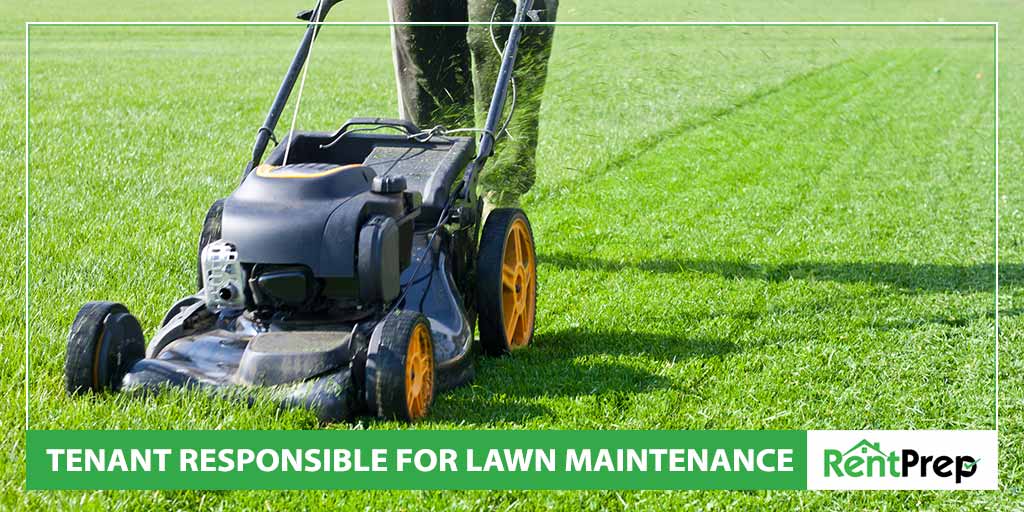
When renting out a property, the tenant gains the right to use the property as their own. In doing so, they take on specific responsibilities. Is the tenant responsible for lawn maintenance as one of those responsibilities, or does that job still fall to the landlord?
This question is confusing for many landlords, particularly when renting in a new area or early in their landlord career. Mismanaging these responsibilities can lead to expensive lawn care services or a lack of understanding between you and the tenant. Either way, it’s best to make sure the designation of responsibility is made clear as early on as possible.
Who is responsible for lawn maintenance, and how can you ensure everyone is on the same page when handling lawn care? Today, use our guide to learn about this balance of rights and responsibilities.
Table Of Contents: Is A Renter Responsible For Lawn Care?
Renters and landlords may disagree about who is responsible for lawn care: landlords or tenants? There are several property management tactics at play here. Learn more about how to determine, delegate, and designate proper lawn care:
- Is A Tenant Responsible For Lawn Maintenance?
- Lawn Care Responsibility Options
- Common Tenant Yard Maintenance Responsibilities
- Document Lawn Care Responsibilities Clearly
- FAQs: Is A Tenant Responsible For Yard Maintenance?
- Is A Renter Responsible For Lawn Care: It May Be Up To You
Is A Tenant Responsible For Lawn Maintenance?

Tenants are not automatically responsible for lawn maintenance when they move in, but landlords might be! It’s important to ensure that you know who is in charge of lawn care at your rental properties. Additionally, you want your tenant also to be aware of these terms.
Generally, tenants are able to be held responsible for lawn maintenance as long as they are the sole users of the lawn. There are some states and localities where landlords might be required to maintain yards, but this is unusual.
However, it is more common for yard care to be the landlord’s responsibility unless otherwise specified in the lease. It’s key that your lease agreement explicitly outlines who is responsible for lawn maintenance and what that care entails.
However, for units where tenants share the yard with tenants in other units, the lawn maintenance typically falls to the landlord. Keep this in mind when you decide to take on your first multi-unit property; lawn care costs should be budgeted into management costs and rent.
State And Local Exceptions
While uncommon, there are some states and areas where very specific laws apply to lawn care. In Minnesota, for example, a landlord cannot require a tenant to take care of the yard on their own without due compensation. Usually, this either means paying them for their services or giving a reasonable discount on rent.
Minnesota is one of the only states with such a law, but there are some areas where restrictions on what can and cannot be asked of the tenant do exist. This is especially true for other seasonal maintenance tasks, like snow removal, so be sure to do your research when assigning and clarifying responsibilities.
Lawn Care Responsibility Options
There are a few ways that lawn care responsibilities are typically distributed between tenants and landlords. Depending on which method applies in your area, your property type, or a specific lease, the exact details of who does what may vary.
Let’s take a closer look at the three major management options: self-service lawn care, full-service lawn care, and a-la-carte lawn care. Keep in mind that these options mainly apply to properties where the tenant has exclusive access to their yard space.
Self-Service Lawn Care: Tenant Does It All
In this type of agreement, the tenant must handle lawn care responsibilities unless otherwise stipulated. This means they must mow, water, and maintain the lawn. In this style, the landlord doesn’t have involvement in this care. However, the tenant may not keep it up to your preferred standards.
Full-Service Lawn Care: Landlord Handles It
In this case, the landlord would handle lawn care and maybe even other seasonal activities such as snow removal. This would mean that you hire a third-party lawn care professional to keep up with the yard most of the time. This costs more money, but you can build it into the rent and ensure that the lawn receives proper care.
A-La-Carte Lawn Care: Mix-And-Match
In some cases, tenants and landlords may prefer to split up the responsibilities. Some tenants don’t mind cutting the grass, but they like the landlord handling fertilizing and watering. Splitting up the arrangement in this way can benefit both parties, and it often provides more flexibility in the agreement.
Discuss with tenants while working on the lease agreement what you plan to do about lawn maintenance. If they seem hesitant or unsure, it may benefit both parties to work out an a la carte arrangement.
Common Tenant Yard Maintenance Responsibilities
What is reasonable to ask of a tenant when they take on yard maintenance? Here is a list of tasks that are often included under the lawn care header:
- Mowing the lawn regularly
- Treating the lawn with fertilizer and weed repellent as needed
- Watering the lawn as needed
- Weeding garden beds, if applicable
Larger tasks that carry more financial and legal risk, such as tree trimming, should be left as a landlord’s responsibility.
Document Lawn Care Responsibilities Clearly

Regardless of what is and is not the tenant’s responsibility when it comes to lawn care, it is key that the information is clearly outlined in the lease. Many new renters are surprised about their responsibilities when they first move into a rental, which can be avoided if you clearly outline rights and responsibilities in your lease.
Leases must cover a lot of information, so it can feel like adding more is not a good idea. However, the point of a lease is to be sure that everyone agrees and is on the same page.
By ensuring that your lease documentation covers lawn care and outdoor maintenance tasks fully, your tenants will not be able to claim that they were unaware. Instead, you’ll have an obvious reference when speaking to them about any responsibilities they are not fulfilling.
Clear documentation is key for good management, and it’s suitable for tenants and landlords alike. Update your lease agreements to match the lawn care maintenance terms applicable to the specific property.
Don’t Forget About Community Ordinances
Ensure that your lease agreement and any related addendums line up with local laws and ordinances related to tenant rights and also lawn care expectations. For example, in some areas, lawns must be cut below a certain height.
If the community has any rules like this in place, be sure they are included in the lease agreement so that the tenant is aware of the expectation.
Update Your Leases, Forms, And More
Keeping your lease terms up-to-date helps ensure that both you and your tenants are aware of who is in charge of lawn maintenance. The same can be said for many other rights and responsibilities that need to be clearly designated to the appropriate party.
If you aren’t sure about whether the documents you use contain all that they should, it’s a great time to check out our Landlord Form Mega Pack.
This megapack includes a huge variety of lease templates, forms, and more that you can use to create your own documents. With these references, you’ll be able to make sure that you have all necessary forms, addendums, and notices on file when you need them.
Stop wasting time wondering what types of files you should create or what they should include. Instead, download the megapack today and immediately improve your management portfolio.
FAQs: Is A Tenant Responsible For Yard Maintenance?
Find out if you should include lawn services in your rental property agreements or not.
Who is in charge of mowing the lawn at a rental property?
In most cases, the tenant is in charge of mowing at a unit they are renting if they have sole use of the yard in question. However, if they share the space with tenants in other units, the landlord or property management team will usually be in charge of lawn care.
Some landlords elect to handle lawn care for their tenants in all cases, to ensure that it is kept to their usual standards. Regardless of what is decided, tenants should be made aware of their rights and responsibilities in their lease agreement, so there is no confusion about who should be taking care of the yard.
Are tenants allowed to hire third-party lawn care services?
Yes, tenants can hire a lawn care team to mow the lawn if they don’t want to do the mowing themselves. The bill will be theirs to cover their responsibility. If the lawn care team causes any damage to the property, however, the repairs could be the tenant’s responsibility.
Many renters choose to do this so they don’t need to invest in a lawnmower or other lawn care tools. Landlords often offer their own lawn care services at a fee to help fill this need while also increasing their own bottom line.
Who has to mow the lawn at a multi-unit property?
At multi-unit properties where the tenants share the yard, it is typically the landlord’s responsibility to handle lawn maintenance. Landlords often build this cost into their leases.
There are some exceptions. Each condo may have its own yard space for some multi-unit locations. In this case, landlords can give tenants the option to opt in or opt out of lawn care for a monthly fee or a similar cost. Ultimately, however, the designation of who will do what should be covered in the lease just as it would be in any other situation.
Do tenants have to rake the leaves in the fall?
If yard maintenance is included as a tenant’s responsibility, then the tenant is also likely to be responsible for seasonal tasks like raking leaves and snow removal. Just as lawn care should be clearly detailed in the lease, these seasonal tasks should also be covered.
Renters who have sole use of a yard take on the responsibility of taking care of the lawn and grounds. This includes ensuring that the grass can stay healthy or in code through raking leaves, watering grass, and keeping it cut to an appropriate level.
As a landlord, it’s your job to handle lawn care for multi-unit properties, including raking the leaves, as it can become a safety hazard on walkways if they are not regularly cleared. Please review local rules and regulations about this before finalizing any leases.
Is A Renter Responsible For Lawn Care: It May Be Up To You
As we’ve learned today, the designation of lawn care responsibilities is very important. In most areas, tenants who rent out single-family homes or otherwise have sole use of the lawn may be responsible for lawn care. However, there are exceptions to this generalization depending on location and property type.
Ultimately, you must take the time to ensure that your lease agreement clearly outlines lawn maintenance responsibilities and who must handle them. This should include grass cutting as well as other lawn care essentials.
Remember the following as you prepare for this discussion with current and potential tenants:
- You can offer lawn care services for additional rent or as-needed fees if you want.
- Lawn care services can be, and often are, the tenant’s responsibility.
- Multi-unit properties that share lawn use should be maintained by management.
By ensuring that your documentation and management style accommodate everything listed above, both you and your tenants will know exactly who is responsible for lawn maintenance, which will be better for everyone.

